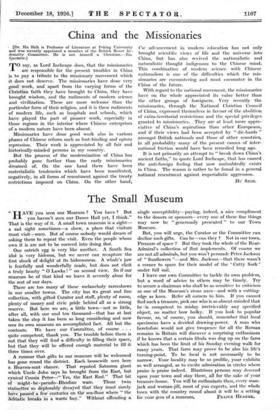The Small Museum
" HAVE you seen our Museum ? You have ? But you haven't seen our Dance Hall yet, I think." That is the way of it. A small town museum is a sight- s sad sight sometimes—a show, a place that visitors must visit=once. But of course nobody would dream of asking them to repeat the visit. Even the people whose own it is are not to be coerced into doing that.
One ostrich egg is very like another. A South Sea idol is very hideous, but we never can recapture the first shock of delight at its hideousness. A whale's jaw is fearfully and wonderfully made, but does not elicit a truly hearty " 0 Lawks ! " on second view. So if our museum be of that kind we leave it severely alone for the rest of our days.
There are too many of these melancholy rareeshows in our smaller towns. The city has its great and fine collection, with gifted Curator and staff, plenty of room, plenty of money and civic pride behind all as a strong reserve. But here we are, a little town—not so little, after all, with our cool ten thousand—that has at last taken the step it has been so long considering and now sees its own museum an accomplished fact. All but the contents. We have our Committee, of course . . . quite competent, thank you. The trouble before them is not that they will find a difficulty in filling their space, but that they will be offered enough material to fill it three times over.
A rumour that gifts to our museum will be welcomed has gone round the district. Each housewife sees here a Heaven-sent chance. That reputed Satsuma giant which Uncle John says he brought from the East, but cynical Cousin Peter—" Yes, the East End." -That bit of • might- be -pseudo - Rhodian ware. Those twin statuettes- so deplorably decayed that they Must surely have pasSed" a few centuries on the sea:floor where " the Ad iatic break.s in a warm bay." Without offending a single susceptibility—paying, indeed, a nice compliment to the donors or sponsors—every one of these fine things may now be " generously presented " to our Town Museum.
But, you will urge, the Curator or the Committee can decline such gifts. Can he—can they ? Not in our town.
Pressure of space ? But they took the whole of the Rear- Admiral's collection of flint implements. Of course we 'are not all admirals, but you won't persuade Peter Jackson of " Sunflowers "—and Mrs. Jackson—that there wasn't a corner to spare for their model of the Cutty Sark ' under full sail.
I leave our own Committee to tackle its own problem, but a word of advice to others may be timely. Try to secure a chairman who shall be as sensitive to criticism as one of the Museum's stone axes—and with a cutting- edge as keen. Refer all corners to him. If you cannot find such a treasure, pick one who is so absent-minded that he is competent to mislay irretrievably any specified object, no matter how bulky. If you look to popular favour, as, of course, you should, remember that local specimens have a decided drawing-power. A man who heretofore would not give twopence for all the Roman remains in Britain will discover a surprising enthusiasm if he knows that a certain fibula was dug up on the farm which has been the limit of his Sunday evening walk for many years. That farm may prove to be also his life's turning-point. To be local is not necessarily to be narrow. Your locality may be so prolific, your exhibits so well arranged, as to 'excite admiration in circles where praise is praise indeed. Illustrious persons may descend upon your town and stay there, all for the sake of your treasure-house. You will be enthusiasts then, every man- jack and woman-jill, most of you experts, and the whole town with the country round' about it will be a setting fOr your gem of a museuni. FRAZER HEARNE.










































 Previous page
Previous page